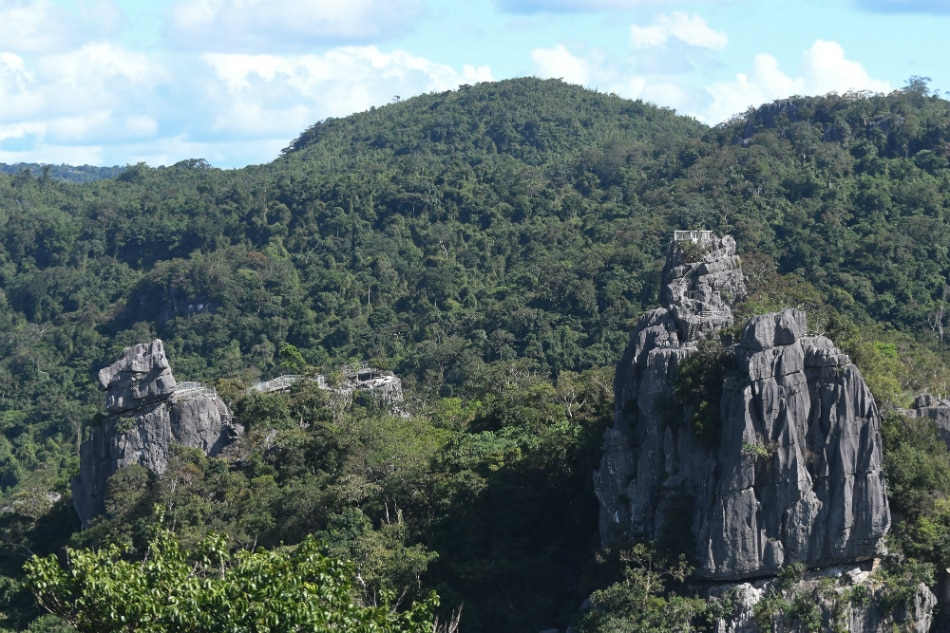How tourism industry can learn from PH's Masungi Georeserve

Welcome, Kapamilya! We use cookies to improve your browsing experience. Continuing to use this site means you agree to our use of cookies. Tell me more!
How tourism industry can learn from PH's Masungi Georeserve
ABS-CBN News
Published Apr 22, 2022 03:02 PM PHT
MANILA -- The tourism industry can learn a lot from the Philippines' Masungi Georeserve as it moves toward sustainability and regeneration.
MANILA -- The tourism industry can learn a lot from the Philippines' Masungi Georeserve as it moves toward sustainability and regeneration.
Managing trustee Ann Dumaliang and her sister, advocacy officer and trustee Billie, were asked to share their insights in a panel discussion at the World Travel and Tourism Council global summit in Manila on Friday.
Managing trustee Ann Dumaliang and her sister, advocacy officer and trustee Billie, were asked to share their insights in a panel discussion at the World Travel and Tourism Council global summit in Manila on Friday.
Citing their experience in Masungi, an award-winning conservation initiative in Rizal province, Ann said regenerative tourism is about designing experiences around sustainability.
Citing their experience in Masungi, an award-winning conservation initiative in Rizal province, Ann said regenerative tourism is about designing experiences around sustainability.
"A lot of learnings can be shared to visitors if only we get to integrate sustainability and stewardship into the experiences that we offer," she said.
"A lot of learnings can be shared to visitors if only we get to integrate sustainability and stewardship into the experiences that we offer," she said.
ADVERTISEMENT
"How do we make them fall in love with the place? How do we make them advocates?" she added. "Our entire visitor and guest experience is designed after that, from the moment they make a request to visit. They don't book, they make a request to visit. The conservation agreements are passed to them and they need to abide by them before we allow them entry."
"How do we make them fall in love with the place? How do we make them advocates?" she added. "Our entire visitor and guest experience is designed after that, from the moment they make a request to visit. They don't book, they make a request to visit. The conservation agreements are passed to them and they need to abide by them before we allow them entry."
Ann pointed out that that tourism industry is in a good position when it comes to experiential learning, saying that multi-sensory experiences can be used to educate the public about caring for the environment.
Ann pointed out that that tourism industry is in a good position when it comes to experiential learning, saying that multi-sensory experiences can be used to educate the public about caring for the environment.
Billie agreed, noting that simple things such as not having trash bins in Masungi teach important lessons to travelers.
Billie agreed, noting that simple things such as not having trash bins in Masungi teach important lessons to travelers.
"When you go to a destination, do not bring more things. Do not burden the destination with more waste and help them be able to sustain themselves," she said.
"When you go to a destination, do not bring more things. Do not burden the destination with more waste and help them be able to sustain themselves," she said.
The Dumaliang sisters also spoke of circularity, which for them is not just a buzzword but a way of life.
The Dumaliang sisters also spoke of circularity, which for them is not just a buzzword but a way of life.
ADVERTISEMENT
"Because we live in a very rural location, we do not have the systems or the usual services that we just rely on," she said. "Going to circularity is about going back to basics. Imagine, 'how do I build this resort, this experience if I were in the ancient times when we didn't have all these?' I think that's one way to think innovatively in terms of how we design our new destinations."
"Because we live in a very rural location, we do not have the systems or the usual services that we just rely on," she said. "Going to circularity is about going back to basics. Imagine, 'how do I build this resort, this experience if I were in the ancient times when we didn't have all these?' I think that's one way to think innovatively in terms of how we design our new destinations."
Ann, for her part, said an important aspect of a circular economy is dematerialization, or "having something of a service instead of a tangible product that has to be replenished and put again and again."
Ann, for her part, said an important aspect of a circular economy is dematerialization, or "having something of a service instead of a tangible product that has to be replenished and put again and again."
"Masungi actually has a huge emphasis on creative engineering. We invest in training our craftsmen, we have engineers who are working on the place. And because of that, there's a lot of emphasis on maintenance," she said.
"Masungi actually has a huge emphasis on creative engineering. We invest in training our craftsmen, we have engineers who are working on the place. And because of that, there's a lot of emphasis on maintenance," she said.
"When it comes to the trails, when it comes to the rope courses and the cables that we have, all of these get repaired most of the time and do not need replacing. It really helps for us to have that skill set in-house. It helps us with creativity, it helps us with circularity."
"When it comes to the trails, when it comes to the rope courses and the cables that we have, all of these get repaired most of the time and do not need replacing. It really helps for us to have that skill set in-house. It helps us with creativity, it helps us with circularity."
ADVERTISEMENT
ADVERTISEMENT



